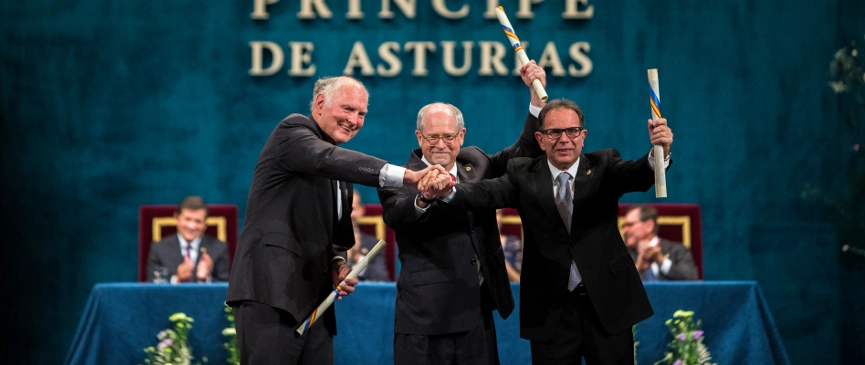Main content
Avelino Corma, Mark E. Davis and Galen D. Stucky Prince of Asturias Award for Technical & Scientific Research 2014

It is a great honour for me to be here with you today.
Let me first offer my deepest thanks to the Prince of Asturias Foundation for having jointly granted me the Prince of Asturias Award for Technical and Scientific Research along with Professor Galen Stucky and Professor Mark Davis. Without doubt, this award also goes to Chemistry and Chemical Engineering, and to those researchers who work silently and unceasingly in our country as well as those who must seek career opportunities abroad.
Today is a day of celebration for the world of culture in its broadest sense, in which I include both Technology and Science. Due to their enormous prestige and media coverage, the Prince of Asturias Awards constitute a wake-up call not only for our society, but, above all, for those who lead it, so that they not forget that most of the problems that afflict us –including those generated by humans– depend on technology and science to find solutions. A wise country is one that invests in what makes it greater and more respected as well as in what makes its citizens happier: education, social welfare, culture, and technological research and development.
I must confess that I was surprised when I was asked to give this speech. We always expect and hope our peers versed in the fields of the Arts and Literature will be the ones to do so. We enjoy and learn from listening to them. In our particular case, our daily activity is carried out in the laboratory and we have almost become used to our imagination being controlled by the laws of physics and chemistry. Although it is true that they do not prevent us from dreaming about crystal structures and the pathways via which molecules circulate and react. They do not prevent us from building new molecules that are not only beautiful, but also functional, without which it would not be possible to understand the advances made in medicine. One might say that if physics allows us to understand and explain nature, chemistry has the ability to create, allowing us to generate previously non-existent molecules and materials. I would like to convey the idea that chemistry is a branch of knowledge which is both comprehensive and cross-disciplinary, as it feeds into materials science, biochemistry, biomedicine and so many other fields. Our ultimate goal is to control and direct chemical reactions in order to selectively obtain the desired product. In fact, life is based precisely on this chemical selectivity. Life would thus be the result of a large number of concatenated chemical reactions. Moreover, and although this idea is sometimes irrationally repudiated, our deepest emotions and feelings are also the result of the chemical reactions that occur in the body. However, for chemical reactions to be described as being successful, they must selectively generate the target molecule. Unfortunately, very few reactions lead solely to the desired product itself, but rather give rise to other by-products in most cases. So, how can it be that the host of chemical reactions constantly occurring in living beings happens to do so in such a selective way? The answer to this question lies in enzymes. These are simply biological catalysts that Nature has been developing and improving through evolution. Catalysts are responsible for increasing the rate of chemical reactions and channelling them to obtain the desired product. Chemistry and catalysis have always been present in humanity’s major revolutions. As examples, we might highlight the discovery of catalysts for synthesizing ammonia that made the manufacture of synthetic fertilizers possible, which led to increased agricultural production and an explosion in population, or catalysts for the production of organic polymers that have improved our quality of life thanks to their impact on agriculture, transport, communications and health. Our research activity has been devoted precisely to the synthesis and reactivity of solid catalysts. We have designed and synthesized materials with suitable pores and structures for chemical reactions to take place inside them, leading to new industrial processes, ones which are more sustainable, consume less energy and generate fewer by-products.
We live in an age dominated by an economy that is at times dehumanizing; making increasingly greater profits is almost the sole objective, while at the same time demanding short-term results from education and research without realizing that the path of learning and knowledge generation is a long one, one which constitutes a journey requiring continuous effort and resources. We must not forget that the purpose of universities and public research centres is not merely to train sound technical specialists duly qualified to succeed in their professional careers. What we wish and pursue is for our young people to receive a well-rounded education as free human beings aware of their social responsibilities – people convinced that our ultimate goal is to achieve a fairer society and who know that we have inherited our planet “on loan”, to be passed on to future generations in optimum condition.
Once again, I thank the Prince of Asturias Foundation for the honour they confer on us, not only by recognizing my personal effort, but also that of all those people who have worked and are working with me, sharing a passion for discovery.
End of main content
